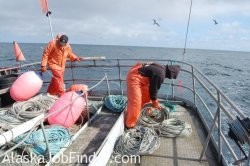Jobs on a Halibut & Sablefish Longliner Interview
Deckhands working on longliners in Alaska have coveted jobs. Their targets – often sablefish (black cod) and halibut – bring top dollar from buyers. So deckhands and skippers can potentially make a lot of money in these fisheries.
AlaskaJobFinder interviewed Matt Marinkovich, and he pulls no punches explaining what the work entails. Plus, he provides excellent tips about job searching and making the most of the adventure. Don’t miss the entire interview!
Become a Member to Access the Entire Interview
What made you want to work in the Alaska fishing industry?
I figured I would go fishing, because it was the family trade, but aside from that I just like to be on the water.
Tell us about the longliner you work on.
I fish for blackcod (officially called sablefish) and halibut.
In early March we load up the boat with the fishing gear, groceries, fuel, etc., then head north. It takes about four days of constant running (we take wheel watches) to travel from Port Townsend to Sitka, which is the port from which we base our Southeastern fishing.
After we catch our quota in the Southeastern areas, we run across the Gulf of Alaska (two days of open ocean) to Seward, and fish the remainder of our quota in the Central Gulf area. When all the fish allotted to the quota share holders on the boat is caught, we head the boat back to Port Townsend. From here it takes just over six days running.
What’s your job title?
I’m the cook! Actually, I’m one of the crewguys who got "stuck" with the job of cooking, which is fine with me because I like to cook. I also take wheel watches when we are running, of course.
Describe the job? Your responsibilities specifically.
I do everything as described above [Become a Member for Whole Interview], but in addition I cook the meals. This means I get to disappear from deck to throw a chicken in the oven, etc., but that DOESN’T mean I have an excuse to vanish from deck and screw-off in the galley.
It takes about 1/2 an hour to haul the buoy line aboard when we are hauling black cod (we fish in deeper water so there’s more buoy line) so I take that time to prepare a "one pot wonder" so all I have to do is run in from deck and pop it in the oven at the appropriate time.
I’m not hired on to be a cook – I’m hired on to work on deck, and since somebody has to cook, I will happily do the job.
What roles do other people play on the vessel?
The roles of notable significance on any boat are:
- Cook
- Captain: This is the guy who is responsible for everything. He is also the guy making the decisions on where to fish, how much gear to set, where to deliver, etc. He is the man.
- Engineer: Somebody has to keep all the equipment running, and the engineer is the guy.
- Deck Slave: "Pull harder!"
On a longliner, the captain is very often the engineer as well. When I go out gillnetting by myself in Puget Sound, I am all of these roles…
Did you receive any special training or preparation for this job? If so, how long did it take and what specifically did that involve?
No training. In fact, they put me at the roller on the very first string we hauled. I had NO idea what was going on, and I parted the gear (broke the line) in short order.
They thought it was funny. I was a bit irritated, but I quickly learned to just roll with the program and not expect anything to go the way I would suggest…
What are the terms of your employment?
I’m hired on at the beginning of the season and am expected to stay through the end, including putting the gear away and cleaning the boat up.
Describe the typical ‘greenhorn’ experience.
These days I don’t think there IS a typical greenhorn experience. I think the realities that commercial fishing reveals is quite an eye-opener, especially for the "download" generation, and everyone seems to handle it differently. Pull your head out of the "cloud" and join reality.
BTW, there’s no cell service for most of the time you are out fishing…
On the occasions you have down time, how did you spend it?
Often our down time is spent in port waiting out lousy weather. I look at these opportunities as if I am on vacation somewhere… I would have time to kill then, so what would I do?
I personally never get bored, but in the event I see the other guys going stir-crazy, I’ll offer up a game of cards or something like that. We don’t watch too many movies because the generator, which is always running, is kind of crazy loud. There is a lot of reading going on at times. I can spend more time cooking up a tasty feast… To me down time is like a vacation.
What’s the best advice anyone gave you about working in this industry?
Shut up and bait.
What personal benefits/rewards do you find from working in the Alaska fishing industry?
I feel there is no better occupation. I couldn’t think of a more suitable profession for myself:
- Odd hours
- Fresh seafood; good meals
- No traffic; no commute
- Screwballs welcome
AlaskaJobFinder Members Get the Whole Interview. Don’t Miss Other Topics Covered, Including:
- Job hunting tips only an expert would know
- Everything you’d ever want to know about how longlining works
- The kind of money you could make
- How expenses are calculated
- and More.
There are hundreds of open jobs right now. Simply click the button below to start your job search.
